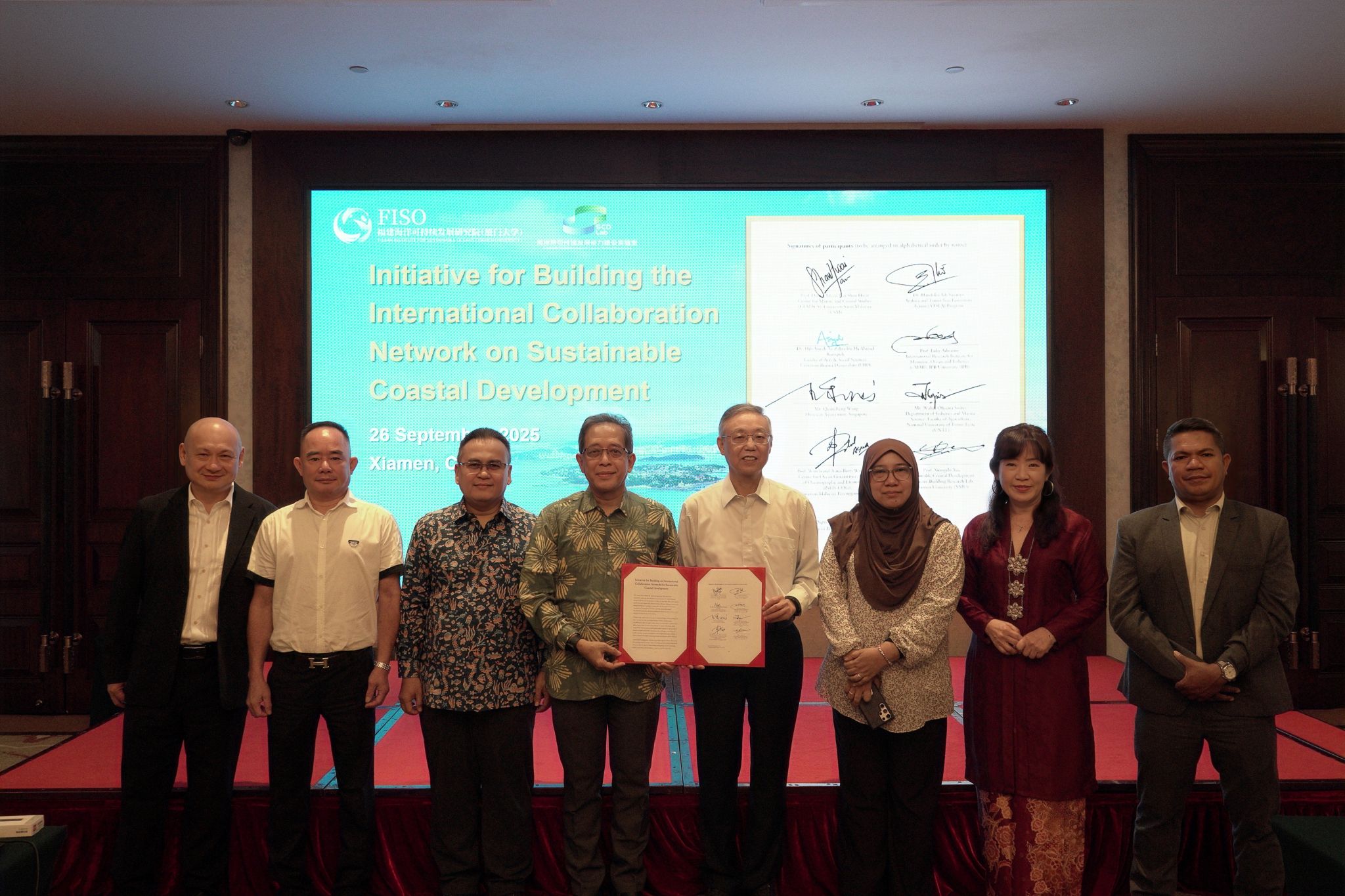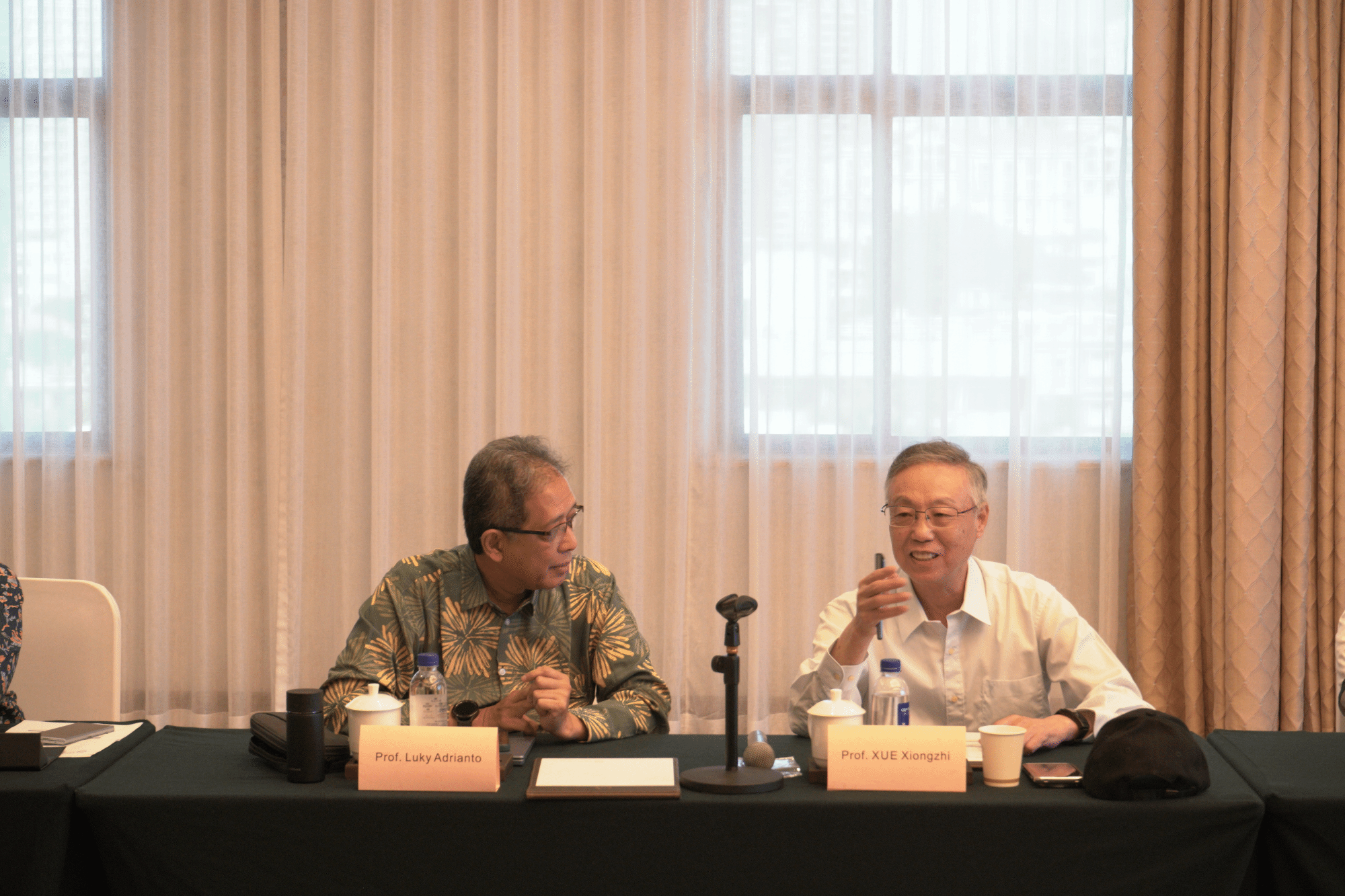2025年9月26日,由厦门大学福建海洋可持续发展研究院(以下简称“闽海院”)与海岸带可持续发展能力建设实验室(以下简称“SCD实验室”)共同主办的“海岸带可持续发展国际合作网络研讨会”在厦门顺利举行。本次研讨会以“构建海岸带可持续发展国际合作网络”为主题,汇聚了来自东帝汶、马来西亚、文莱、新加坡、印度尼西亚、中国等多个国家的高校、科研机构、区域项目和商会代表共同参与。
平衡海岸带的发展与保护是全球性挑战,破解之道在于基于科学的管理和广泛的国际合作,通过加强知识共享与政策协同来提升治理水平。在此背景下,经SCD实验室发起,与会的各位专家、学者和商会代表讨论,共同签发了“构建海岸带可持续发展国际合作网络”的倡议。该倡议呼吁各方携手,汇聚科研机构、高校、企业及国际组织的知识、经验与资源,积极促进科技合作、能力建设与政策对话,通过联合研究、培训与知识共享,推动基于科学的海岸带管理,共同应对气候变化与生态退化等挑战,为构建海洋命运共同体贡献力量。
本倡议由八个单位的代表共同签署,分别是:印尼茂物农业大学海事海洋与渔业国际研究院(i-MAR)主席Luky Adrianto教授、马来西亚理科大学海洋与海岸带研究中心(CEMACS)主任Aileen Tan Shau Hwai教授、马来西亚登嘉楼大学海洋与环境研究院海洋治理中心(INOS-COG)负责人Wan Izatul Asma Binti Wan Talaat教授、印尼阿拉弗拉海和帝汶海生态系统项目(ATSEA)执行主任Handoko Adi Susanto博士、文莱达鲁萨兰大学文学与社会科学学院院长Hjh Asiyah Az-Zahra bte Hj Ahmad Kumpoh博士、东帝汶国立大学农业学院渔业与海洋科学系主任Walter Oliveira Soares先生、新加坡华源会会长王泉成先生和闽海院院长/SCD实验室主任薛雄志教授。

 倡议签署仪式合影
倡议签署仪式合影
Group Photo of the Signing Ceremony
本次研讨还对海岸带可持续发展国际合作网络章程进行了讨论,对相关细节问题进行了审议和确认,并一致推选倡议发起单位——SCD实验室主任薛雄志教授为首届指导委员会主席,Luky Adrianto教授为副主席。下一步将筹办首批成员单位加入网络的签约仪式,推动网络进入实质运行阶段。


薛雄志(右)与Luky Adrianto在研讨会中
Prof. Xue and Prof. Luky in the Seminar
本次会议是闽海院与SCD实验室推动区域海洋治理与海岸带可持续发展能力建设的重要实践,也是深化中国—东盟海洋合作、落实“一带一路”倡议背景下国际合作的具体举措。未来,各方将依托该合作网络,推动信息共享、技术协作与联合项目实施,共同促进海岸带地区生态环境保护与可持续发展,为区域乃至全球海洋治理注入新动能。


研讨会合影
Group Photo
On September 26, 2025, the Seminar on International Collaboration Network for Sustainable Coastal Development was held in Xiamen, organized by the Fujian Institute for Sustainable Oceans at Xiamen University (referred to as “FISO”) and the Sustainable Coastal Development Capacity-Building Research Lab (referred to as “SCD Lab”).
With the theme “Initiative for Building the International Collaboration Network on Sustainable Coastal Development”, the seminar brought together representatives from universities, research institutes, regional program, and overseas Chinese association across several countries, including Brunei, China, Indonesia, Malaysia, Singapore, and Timor-Leste.
Balancing coastal development and conservation is a global challenge. The key to addressing it lies in science-based management and extensive international collaboration, enhancing governance through knowledge sharing and policy coordination. Against this backdrop, initiated by the SCD Lab, the Initiative for Building an International Collaboration Network for Sustainable Coastal Development (referred to as “the Initiative”) was discussed and signed by 8 representatives.
The Initiative calls on stakeholders to work hand in hand—pooling knowledge, experience, and resources from research institutes, universities, enterprises, as well as regional and international organizations—to promote scientific collaboration, capacity building, and policy dialogue. Through joint research, training, and knowledge sharing, the Initiative aims to advance science-based coastal management, jointly address challenges such as climate change and ecological degradation, and contribute to building a shared future for the oceans.
The Initiative was co-signed by representatives from eight institutions:
· Prof. Luky Adrianto, Chairperson of the International Research Institute for Maritime, Ocean and Fisheries (i-MAR), IPB University, Indonesia
· Prof. Aileen Tan Shau Hwai, Director of the Centre for Marine and Coastal Studies (CEMACS), Universiti Sains Malaysia, Malaysia
· Prof. Wan Izatul Asma Binti Wan Talaat, Head of the Centre of Ocean Governance (INOS-COG), Institute of Oceanography and Environment, Universiti Malaysia Terengganu, Malaysia
· Dr. Handoko Adi Susanto, Interim Executive Director of the Arafura and Timor Seas Ecosystem Action (ATSEA) Program
· Dr. Hjh Asiyah Az-Zahra bte Hj Ahmad Kumpoh, Dean of the Faculty of Arts and Social Sciences, Universiti Brunei Darussalam, Brunei
· Mr. Walter Oliveira Soares, Head of the Department of Fisheries and Marine Sciences, Faculty of Agriculture, National University of Timor-Leste, Timor-Leste
· Mr. Wang Quancheng, President of Hua Yuan Association, Singapore
· Prof. Xue Xiongzhi, Dean of FISO and Director of SCD Lab, China
The seminar also discussed the Charter of the Network, reviewing and approving its details. The participants unanimously elected Prof. Xue Xiongzhi, Director of the SCD Lab (initiator of the Initiative), as the inaugural Chair of the Steering Committee, and Prof. Luky Adrianto as Vice Chair. A signing ceremony will soon be organized for the first batch of member institutions, marking the transition of the network into its substantive operational phase.
This seminar represents an important practice by FISO and the SCD Lab in promoting regional ocean governance and capacity building for coastal sustainability. It is also a concrete step toward deepening China–ASEAN maritime cooperation and advancing international collaboration under the framework of the Belt and Road Initiative. Looking ahead, all parties will leverage the network to foster information sharing, technological collaboration, and joint project implementation, thereby advancing ecological protection and sustainable development in coastal areas, and injecting new momentum into regional and global ocean governance.
附:倡议全文
Appendix.
The Initiative for Building an International Collaboration Network for Sustainable Coastal Development
The coastal zone is where the ocean and land meet. With abundant biodiversity, resources and ecosystem service functions, it’s vital for human beings’ livelihood and development. It’s home to more than 40% of the world’s population, and supports key industries such as fisheries, shipping, tourism and energy development, making it a pivotal pillar for the social and economic foundation of coastal states. For these countries, sustainable coastal development is not only essential to ecological security, but also fundamental to economic prosperity and social stability.
However, the coastal zones are facing mounting challenges. Climate change has led to sea-level rise and increasingly frequent extreme weather events, threatening the safety of coastal communities. Overexploitation, pollution and habitat destruction have led to sharp declines in marine biodiversity, while unsustainable fisheries and tourism further deplete resources. High population density in coastal areas further exacerbates these challenges, intensifying the conflict between economic development and ecological protection. Striking a balance between development and conservation has become a global challenge.
Science-based management is at the core of achieving such balance. Advancing this principle requires stronger capacity building and international cooperation, which provide the basis for disseminating and applying scientific knowledge, modern approaches, and management expertise, thereby improving management effectiveness. By employing modern approaches such as integrated coastal management and marine spatial planning, scientific support can be provided for management decisions. Capacity building facilitates communication and alignment between scientists and policymakers. At the same time, given the high connectivity of marine ecosystems, strengthening international cooperation and sharing research outcomes and best practices are of great significance for promoting sustainable coastal development at regional and global levels.
Under this background, the China Oceanic Development Foundation and Xiamen University jointly established the Sustainable Coastal Development Capacity-Building Research Lab (hereinafter the "SCD Lab") based on Fujian Institute for Sustainable Oceans (Xiamen University). The SCD Lab is a multidisciplinary platform dedicated to multi-dimensional endeavors, with focus on capacity assessment, capacity building and international cooperation for sustainable coastal development. It aims to provide scientific support for ocean governance and policy-making, and to contribute to the building of a maritime community with a shared future.
To this end, we, the SCD Lab, together with our partners, hereby propose to establish the "International Collaboration Network for Sustainable Coastal Development", with initiatives spanning three dimensions: scientific research collaboration, capacity-building, and academic exchange, as outlined below:
I. Scientific Research Collaboration
Building on the scientific strengths and expertise of participating institutions within the network, we will jointly seek diverse resources and apply for national and international research funding. Together, we will advance both theoretical and applied research in the field of marine and coastal sustainable development, including but not limited to integrated coastal management, marine spatial planning, country-specific studies of sustainable coastal development capacity, blue economy, marine biodiversity conservation, fisheries management, marine pollution, and marine disaster prevention and mitigation. We also commit to actively transforming research outcomes into evidence-based policy support.
II. Capacity-Building
Through short-term training programs and degree education, joint summer courses and among other activities, we will work to enhance regional capacity for sustainable coastal development. Internship opportunities will also be created across partner institutions to provide early-career researchers and students with hands-on exposure to integrated coastal management practices.
Special emphasis will be placed on problem-driven capacity building, where science is connected to societal needs. By making full use of the Xiamen University Sustainable Coastal Development Scholarship and other scholarship resources, we will support outstanding students dedicated to marine and coastal sustainable development in pursuing master’s and doctoral degrees, nurturing the next generation of experts in this field.
III. Academic Exchange
We will promote academic and research exchange by sharing access to academic forums, workshops and seminars, thereby fostering closer interaction among scholars from different institutions. We also encourage short-term visits and exchange opportunities for faculty and students, further deepening academic dialogue and collaboration.
Our Proposal
We, the participating members, jointly propose to establish the International Collaboration Network for Sustainable Coastal Development, which aims to bring together knowledge, experience, and resources of research institutions, universities, enterprises, and international organizations. Together, we will address the challenges to sustainable coastal development posed by climate change, ecological degradation, among other pressing threats, while collaboratively advancing scientific research, capacity building, and governance innovation in the field of sustainable coastal development. This network will dedicate itself to promoting scientific collaboration, capacity building, and policy dialogues. Through joint research, training, and knowledge sharing, it will facilitate evidence-based coastal management practices, providing scientific support and a cooperative platform for building a maritime community with a shared future. Furthermore, we warmly welcome more research institutions, universities, and enterprises to actively participate in this collaboration network, working together to enhance global capacity for sustainable coastal development.


